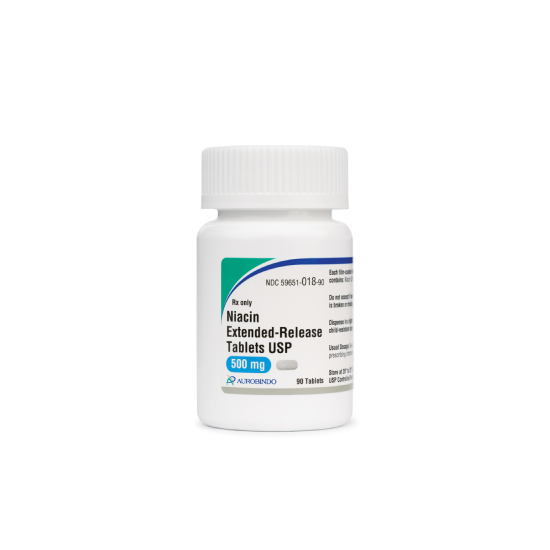This product is available solely through our 503A Compounding Pharmacy, ensuring personalized care and precision in every order. Please note that a valid prescription is required for purchase. If you do not have an account, please contact us.
Niacin SR Tablet (Each) †
† commercial product
Essential for the body’s energy metabolism is niacin, a form of vitamin b3. Beyond possible metabolic activities, niacin may have antidyslipidemic effects, therefore it is a Possible solution for the treatment of dyslipidemia and associated cardiovascular diseases.
Niacin also acts as a forerunner to nicotinamide adenine dinucleotide (NAD), a vital coenzyme participating in several cell activities including control of energy generation and others. Gene expression: niacin helps to preserve cell integrity and function via conversion to the metabolically active NAD,
hence affecting a large spectrum of physiological From metabolism to cellular signaling and oxidative stress control, functions abound.
A vasodilator, niacin can help expand blood vessels, hence improving blood flow. This can lead to flushing, especially in the chest, neck, or face.
Compared to immediate-release forms, some sustained-release forms of niacin can have reduced reported flushing but can have higher risk of liver toxicity.
Niacin works by affecting the way fats are processed in the body. It reduces the production of low-density lipoprotein (LDL) cholesterol and triglycerides while increasing high-density lipoprotein (HDL) cholesterol. Niacin also helps widen blood vessels, improving blood flow and reducing inflammation in the arteries. The sustained-release formula allows the medication to be absorbed slowly, providing long-lasting effects throughout the day.
Niacin SR should not be used by individuals with active liver disease, severe kidney issues, or peptic ulcers. People with a history of gout or uncontrolled diabetes should exercise caution, as the medication may affect blood sugar or uric acid levels. Before starting therapy, it’s essential to discuss any other health conditions or medications with your healthcare provider. Alcohol consumption should be limited, as it may worsen liver-related side effects.
Niacin SR may interact with medications such as blood thinners, diabetes drugs, and other cholesterol-lowering treatments. Combining it with certain antihypertensive drugs or statins may require close monitoring due to increased risk of side effects. Always inform your doctor about any other medications, supplements, or herbal products you are taking to avoid unwanted interactions.
Some users may experience side effects like flushing, itching, or warmth in the face and neck, especially when starting treatment. Other mild effects include upset stomach, headache, or dizziness. Rare but serious side effects include liver dysfunction, irregular heartbeat, or muscle pain. If any severe symptoms occur, such as yellowing of the skin or persistent discomfort, medical attention should be sought promptly.
The safety of Niacin SR during pregnancy and breastfeeding has not been fully established. It should be used only if the potential benefits outweigh the risks and if recommended by a healthcare provider. Pregnant or nursing mothers should discuss their condition with their doctor before beginning treatment to ensure the safety of both mother and child.
Store this medication at 68°F to 77°F (20°C to 25°C) and away from heat, moisture and light. Keep all medicine out of the reach of children. Throw away any unused medicine after the beyond use date. Do not flush unused medications or pour down a sink or drain.
- National Institutes of Health (NIH) Office of Dietary Supplements. Niacin – Health Professional Fact Sheet. Available from: https://ods.od.nih.gov/factsheets/Niacin-HealthProfessional/– LinkOpens in New Tab
- “Niacin.” MedlinePlus, U.S. National Library of Medicine, medlineplus.gov/druginfo/meds/a682518.html.
- “Niacin.” PubChem, National Center for Biotechnology Information, pubchem.ncbi.nlm.nih.gov/compound/Niacin.
- Niacin, Niacinamide. Clinical Pharmacology powered by ClinicalKey. Elsevier. Updated May 14, 2024. Accessed June 25, 2024. https://www.clinicalkey.com/pharmacology/monograph/1473?sec=mondesc





